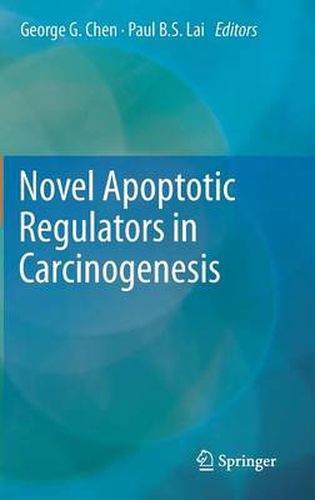Readings Newsletter
Become a Readings Member to make your shopping experience even easier.
Sign in or sign up for free!
You’re not far away from qualifying for FREE standard shipping within Australia
You’ve qualified for FREE standard shipping within Australia
The cart is loading…






This title is printed to order. This book may have been self-published. If so, we cannot guarantee the quality of the content. In the main most books will have gone through the editing process however some may not. We therefore suggest that you be aware of this before ordering this book. If in doubt check either the author or publisher’s details as we are unable to accept any returns unless they are faulty. Please contact us if you have any questions.
Our recent understanding of the cellular and molecular defects and the regulation of the apoptotic signalling pathways has resulted in rationally designed anticancer strategies and the development of novel agents that regulates apoptosis. A comprehensive review of all apoptotic-related anticancer therapies is not the purpose of this book. However, in the volume of this book with 11 chapters, we have described a number of novel apoptotic regulators that have shown promising value and also great feasibility for cancer treatment. These novel agents either occur naturally or are chemically synthesized. While we are excited about the discovery and development of these novel apoptotic regulators as potential anticancer agents, a degree of caution should be always borne in mind when interpreting the success of preclinical pro-apoptotic candidates since potential problems inevitably lie ahead. These problems usually include target specificity, unanticipated toxicity, compound stability, formulation issues, pharmacokinetic and pharmacodynamic profiles. Nevertheless, we believe that this collection of 11 chapters by established leaders in the area of apoptosis will be of great interest to not only academics working in the field of cancer research and apoptosis but also pharmaceutical and pharmacological industries that . We are looking forward to the further development to push these potential agents toward clinical stage.
$9.00 standard shipping within Australia
FREE standard shipping within Australia for orders over $100.00
Express & International shipping calculated at checkout
This title is printed to order. This book may have been self-published. If so, we cannot guarantee the quality of the content. In the main most books will have gone through the editing process however some may not. We therefore suggest that you be aware of this before ordering this book. If in doubt check either the author or publisher’s details as we are unable to accept any returns unless they are faulty. Please contact us if you have any questions.
Our recent understanding of the cellular and molecular defects and the regulation of the apoptotic signalling pathways has resulted in rationally designed anticancer strategies and the development of novel agents that regulates apoptosis. A comprehensive review of all apoptotic-related anticancer therapies is not the purpose of this book. However, in the volume of this book with 11 chapters, we have described a number of novel apoptotic regulators that have shown promising value and also great feasibility for cancer treatment. These novel agents either occur naturally or are chemically synthesized. While we are excited about the discovery and development of these novel apoptotic regulators as potential anticancer agents, a degree of caution should be always borne in mind when interpreting the success of preclinical pro-apoptotic candidates since potential problems inevitably lie ahead. These problems usually include target specificity, unanticipated toxicity, compound stability, formulation issues, pharmacokinetic and pharmacodynamic profiles. Nevertheless, we believe that this collection of 11 chapters by established leaders in the area of apoptosis will be of great interest to not only academics working in the field of cancer research and apoptosis but also pharmaceutical and pharmacological industries that . We are looking forward to the further development to push these potential agents toward clinical stage.